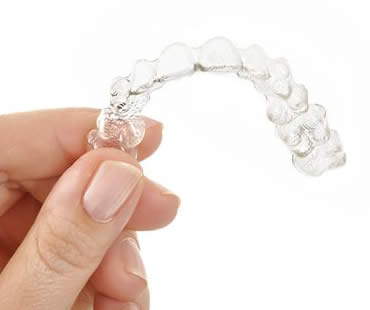
Oct 4, 2019
Porcelain veneers hide your teeth’s imperfections so that you are happier with your smile. They are very thin shells that are adhered onto the fronts of your teeth to permanently give you the look you want. Veneers can make your teeth look straighter, whiter, and better than ever before.
How do you know if veneers might be right for you? Here are some things to consider when deciding whether veneers can help your smile:
- You would like to alter your teeth permanently.
- You want to change the color of your teeth.
- Your front teeth are broken or chipped.
- Your teeth are not evenly spaced.
- Your teeth are not aligned straight.
- You’d like to improve your smile quickly.
- You don’t want to affect much of your natural teeth.
- You would like a brighter smile.
If any of these statements describe your situation, then porcelain veneers might be a good choice for you. Of course the first thing you need to do is consult a dentist for advice. Many times, the ideal person for the job is a cosmetic dentist. This type of specialist focuses on performing procedures to help patients achieve their cosmetic smile goals. Veneers is one such treatment that has grown in popularity because it transforms smiles in just a few short appointments, and it is a painless approach.
When you visit a cosmetic dentist, you will be able to describe what bothers you about your teeth and learn if you are a good candidate for veneers. If so, the dentist will explain the simple process of having your porcelain veneers custom-made in a lab for you. Your natural teeth will undergo some minor preparation, and when your veneers are ready the dentist will securely attach them to your teeth. Then you will be set to show off your new smile!
If you need a dentist in Fall River contact us today

Jan 31, 2020
An embarrassing smile can ruin your ability to smile freely, opting to hide your teeth so that others can’t see them. Dental veneers, thin shells often made of porcelain attached to the fronts of your teeth, transform your smile to one you can display with pride. They are customized for each patient to give you the look you desire.
There are numerous dental problems that can be hidden with porcelain veneers. Common reasons that people choose veneers include tooth discoloration, chips, breaks, worn down teeth, gaps, misalignment or misshapen teeth. These restorations cover all of these problems and more, giving you the perfect smile.
The process for getting veneers is not painful and usually requires a few trips to the dentist. First you’ll need a consultation to determine if you are a good candidate. You should tell the dentist exactly what you dislike about your smile and learn if veneers can correct those issues. If so, your next appointment will include preparing your teeth by removing a small amount of your enamel so the veneers can be attached. Your dentist will make an impression of your mouth so that veneers can be crafted in a lab to fit exactly. The last step is a visit to have the final veneers bonded to your teeth, adjusted, and polished for a flawless appearance.
You can count on porcelain veneers to resist stains so that they continue to look just like they did when applied. You can choose the veneer color to get just the shade you desire, and your smile will look very natural. Another benefit is that your gums should adjust very easily to porcelain veneers. Keep in mind, however, that veneers are a permanent solution and if they do become damaged it’s likely you’ll have to completely replace them. The lifespan of veneers is often ten years or more, and they don’t require any special care other than normal dental hygiene.
Veneers provide patients with the ability to turn their smiles around for good. If you’re unhappy with the look of your teeth, consult your dentist to see if veneers will help you regain your confidence.
Our dental office is located in Fall River

Nov 29, 2019
Some people would rather endure tooth pain than have their wisdom teeth extracted during surgery. Most of the time, fears are based on irrational tales that people read on the internet or hear from others. The truth is that wisdom tooth surgery is extremely common and most oral surgeons perform them every day without complications. The best way to overcome fear is to learn more about the procedure and recovery.
Procedure:
Extracting wisdom teeth involves opening the gums above the tooth and removing any bone that is blocking the tooth’s ability to erupt. The tissue will be separated to be able to remove the tooth, sometimes even in pieces if necessary. In some cases when bone is removed, a bone graft is needed to replace it. After the procedure is complete, stitches will be placed that will dissolve with time. If this sounds awful, remember that patients don’t feel any pain during the procedure due to sedation and usually don’t even recall anything that happened during treatment.
Recovery:
There are some common outcomes to be expected after wisdom tooth extraction, all of which usually subside within a few days as long as you follow your surgeon’s instructions. Have someone accompany you to and from the appointment so they hear the recovery directions and so you don’t drive. Afterwards, you will be given gauze to bite on at the extraction site. Bite gently on the gauze and change it frequently. Avoid lying flat on your back because bleeding may increase. If you experience swelling, hold ice packs on the outside of your cheeks for the first day. Eat soft foods and avoid using a straw for the first few days, and try not to touch the area with your fingers or tongue. Do not smoke for at least 24 hours after oral surgery. If you follow all these guidelines and any others that your doctor provides, there are few risks and no reason to be afraid of wisdom tooth extraction.
Schedule your appointment at our Fall River dental office

May 31, 2019
The school year has started and kids are busy with school, sports, and social activities. It’s a challenge sometimes to get your kids to eat healthy when they are on-the-go, not only for their overall health but also for their oral health. Here are some tasty and healthy snacks that you can offer your kids, and chances are they’ll like them!
Yogurt
Dairy foods help build strong bones, and they’re also great for a strong mouth. Eating low-fat yogurt provides calcium. Try mixing it with berries and granola for a healthy parfait, or making homemade fruity yogurt popsicles to attract your children’s attention.
Cheese
Besides providing calcium, cheese helps fight cavities. It triggers saliva production, which washes away food particles in your mouth and the acids that can weaken your teeth. In these ways, cheese halts the process of cavity formation. Cheese not only contains calcium but also phosphorous, which both help rebuild the enamel on your teeth.
Blueberries
These berries may be small, but they’re packed with Vitamin C, minerals, and folic acid. They also contain ingredients which studies show help prevent diabetes and cancer. Try adding blueberries to pancakes and muffins, or sprinkling them with a small amount of sugar and topping them with whipped cream.
Almonds
Nuts like almonds contain ingredients to fight diseases, as well as Vitamin E, fiber, calcium, and iron. Most kids enjoy eating almonds raw, but remember they are a choking hazard for young children.
Whole wheat bread
Bread made with whole wheat provides kids with iron, zinc, magnesium, and vitamins. Whole grain cereal offers calcium, fiber, and vitamins. Enjoying these whole wheat snacks with milk provides an even healthier snack for your kids.
Schedule your appointment at our Fall River dental office

May 24, 2019
One of the newest ways to spruce up your look is to correct your teeth with Invisalign. This is an orthodontic solution that allows your teeth to be straightened without having to wear unsightly or embarrassing traditional braces. Invisalign allows you to improve your smile without affecting your eating habits, oral care routine, or self-esteem throughout the treatment process.
Description:
A series of customized plastic aligners are created to wear over your teeth to gradually move them into better position. You are able to see your treatment plan on a computer before treatment even begins, and your dentist monitors progress during checkups to make sure things are changing as desired. The clear aligners with Invisalign are popular because they are nearly invisible, can be removed for cleaning and eating, and are comfortable without causing irritation.
Correction:
Invisalign corrects various dental issues, including crowded teeth, gaps, overbites, underbites, or crossbites. Dentists often advise wearing retainers after treatment to ensure that teeth remain in their new position.
Process:
Once you select a dentist for your Invisalign treatment, an examination and discussion of goals will determine if this type of orthodontics is right for you. If you are a good candidate, a mold will be made of your teeth as well as a three dimensional image to help your dentist determine your treatment plan.
Maintenance:
Invisalign aligners are easily cleaned when removed from your mouth with gentle brushing and rinsing. You can perform your normal oral hygiene routine before returning the aligners to your mouth.
Our dental office is located in Fall River

May 17, 2019
Lots of people feel self-conscious about smiling, and problems with their teeth can make them hesitant to talk and laugh with others. Veneers are an easy way to transform teeth, and to get that gorgeous smile you’ve always wanted. Dental veneers are made from very thin pieces of porcelain or composite resin and fit tightly over the front surfaces of your teeth. They can mask many different types of imperfections and are a great way to improve the appearance of your smile.
In spite of this, veneers are not suitable for everyone. Your cosmetic dentist in Fall River can help you decide if veneers are the best choice of treatment, or if another solution might be more appropriate. This procedure is not usually reversible so it’s important to be sure before your teeth are prepared for veneers. The following guidelines will help you determine if dental veneers are right for you.
Tooth Decay
Teeth that are decayed or which have already been filled are weaker and less able to support veneers. In this case you may be better off considering dental crowns that completely cover up decayed teeth right down to the gum line.
Gum Disease
You will need to have a full checkup with your dentist in Fall River prior to having veneers. If you have any signs of gum disease then this condition must be treated first. It’s important to be in good oral health before your veneers are fitted.
Bad Oral Habits
Nail-biting, biting on ice cubes and teeth grinding can all damage veneers. If you have any of these habits then you’ll need to quit if you want your restorations to last.
Misaligned Teeth
If your teeth are quite crooked or misaligned, consider consulting an orthodontist to decide if braces are a better solution. It could be that once your teeth are straightened you’ll no longer need veneers. Dental veneers are not meant to correct severely misaligned or crooked teeth.

May 10, 2019
You may already know that consuming sugar brings health risks with it. It can contribute to obesity, diabetes, and heart disease, but it can also harm your teeth and gums. Even if you avoid desserts and sugary treats, you may be consuming more sugar than you realize. You should be aware that sugar is hidden in foods that you may not have considered.
Since the sweetened taste of sugar entices many people, manufacturers tend to add sugar to just about anything. Examples include crackers, condiments, salad dressing, peanut butter, yogurt, sauces, and protein bars. Manufacturers also list sugar on food labels under other names to trick people. Some alternate names for sugar are sucrose, dextrose, maltose, and molasses. Another hidden ingredient to avoid is high fructose corn syrup.
How can you avoid sugar if it’s lurking in the foods you enjoy? Here are some helpful hints in limiting your sugar intake:
- Eat whole food instead of processed food. Vegetables, fruits, and nuts are some other choices that will fill you up without the added sugar.
- Look for products that are sugarless or don’t have added sugars. Even foods labeled “low sugar” may contain more than you’d like.
- Drink sugarless beverages that won’t flood your mouth with sugar. Sodas, sweetened juices, and sweetened coffee provide lots of sugar and calories. Water is always an ideal choice to quench your thirst.
- Steer clear of artificial sweeteners, which don’t fill you up and leave you craving more sweets.
- Give yourself time to get used to having less sugar in your diet. Foods may taste less satisfying as you adjust, but you’ll get accustomed to the flavors that foods provide without the extra sweetness.
If you need a dentist in Fall River contact us today

May 3, 2019
Tooth pain that occurs when you eat or drink something cold or hot is an indicator that your teeth are overly sensitive. It can also result from eating sour or sweet foods, and sometimes just from breathing in cold air. Usually tooth sensitivity happens when your enamel has worn down, exposing the inner part of your tooth where sensitive nerves are located. It’s important to know what kinds of things may trigger tooth sensitivity, in hopes of avoiding it in the future.
Tooth decay
Decay leads to cavities, which are holes in your teeth or damage to their structure. Tooth decay and the resulting cavities are often preventable with good dental care. If you develop a cavity, however, it’s vital to get it repaired so that area of your teeth doesn’t become overly sensitive and painful.
Gum disease
Early gum disease, called gingivitis, is usually caused by poor dental hygiene that leads to gum inflammation and redness. Your gums may bleed easily and become sore. As gingivitis worsens, your gums can recede and expose the roots of your teeth. Your roots contain nerve endings, and sensitivity will likely increase.
Trauma
Accidents to your teeth or gums may lead to sensitivity. Fractured or knocked out teeth are certainly susceptible to painful sensations in your mouth.
Teeth whitening
Many people who use teeth whitening methods complain that their teeth become more sensitive with use of these products. Some whitening techniques cause this sensation more than others, so you may have to try several if you want to pursue teeth whitening without the sensitivity.
Remedies
One way to treat this problem is to use toothpaste intended for sensitive teeth. Also, avoid foods and drinks that tend to increase your symptoms. If you do consume items that cause discomfort, gently brush your teeth afterwards to help reduce the effects.
We treat patients from Fall River and the surrounding area

Apr 26, 2019
Losing teeth for one reason or another is not as uncommon as you might think. Injuries and severe tooth decay are only a couple of the causes for smiles to have holes in them from missing teeth. The good news is that you don’t have to go through life with an incomplete smile. Dental implants provide one solution for replacing lost teeth.
Popularity
These restorations that involve a titanium root with an artificial tooth on top have become increasingly popular. Instead of using bridges or dentures that are known to have some hassles with them, implants are a permanent and secure solution. Once the area has healed, you can go back to your normal habits without any concerns related to the implant. They look very natural, preserve neighboring teeth, improve speech, restore the mouth’s function, and help maintain your facial features.
Candidates
Good candidates for implants have strong enough jaw bones to be able to support the implant. Patients with significant bone loss may not be able to successfully maintain implants. Good oral health is helpful, as is good general health since surgery is required. Smokers and those with certain health conditions may not be recommended for dental implants.
Procedure
Once you’ve been identified as a good candidate, the first step is having the titanium rod inserted into your jaw bone. It can take up to three months for it to completely fuse with your bones. Then your dentist will make an abutment to hold the implant, and a mold will be taken of your mouth so that the crown can be created. Until it is ready, a temporary crown will be placed. Finally, your crown will be placed and adjustments will be made if needed.
Maintenance
After you implant is complete, you can resume your regular lifestyle. Your normal dental hygiene routine of brushing, flossing, and checkups should be maintained for the best results.
We offer dental implants at our Fall River dental office.

Apr 19, 2019
Some of the main reasons many people don’t like to visit the dentist is due to the pain involved with some procedures, or simply the fear of the experience. That’s why dentistry has come up with a way to provide people with dental care, but relieving those common reasons for avoiding it. Sedation dentistry allows patients to have dental work without feeling pain or experiencing anxiety.
Process
Sedation dentistry uses sedative drugs in a safe way for patients to be calmed during dental procedures. You are not fully put to sleep, but the effects of the sedative can make you feel sleepy and it’s likely you won’t remember much about your dental work. It is formally regulated, and side effects are uncommon. Your dentist adjusts the amount of medication used to meet the needs of each patient. There are even choices about the sedation technique used. In the past, intravenous sedation delivered by injection was the most common. Today, alternatives like inhaling nitrous oxide and other approaches that don’t require needles are possible. Your dentist can discuss your options and help you decide which is best for you.
Pain management
Many patients are interested in sedation dentistry so that the pain felt during dental procedures is reduced. This is more than just numbing the area to be worked on; you can actually be put to sleep so you do not feel anything at all. Sedation dentistry is often recommended for sensitive procedures that have greater pain associated with them.
Relaxation
Another popular reason for sedation techniques is to relax the patient. This calms you during the procedure so that the dental work can be performed without increased risk of injury or avoidance. A common level of sedation for this purpose is called the twilight stage, which allows you to respond to the dentist but your awareness of the procedure itself is limited. This allows many patients to get through dental procedures much more comfortably as opposed to when fully awake and alert.
Schedule your appointment at our Fall River dental office










